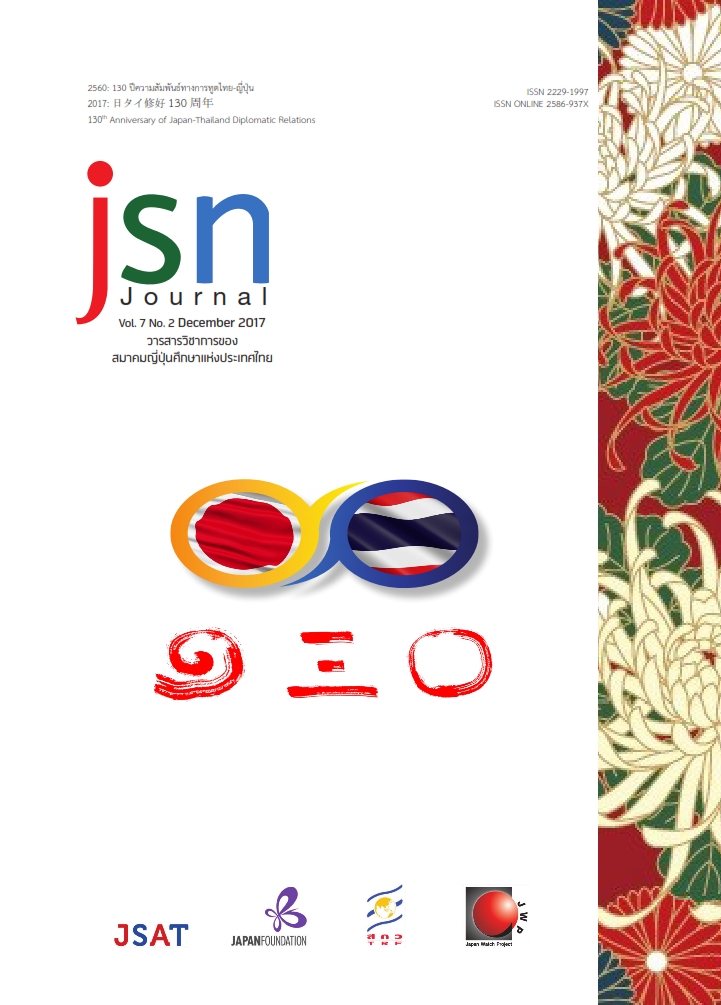Global Human Resources Development: Preparation for Internships Abroad
Main Article Content
Abstract
visiting Japanese companies in Thailand; 3) cultural exchange opportunities with Japanese people; and 4) inviting experts from the private sector to give lectures on Japanese business culture and business etiquette.
Recently, the number of foreign students hoping to find a job in Japan has increased, and educators have attempted to equip students with the necessary skills to work globally. An off-campus internship (for a total of 150 hours) during the summer has been offered to students majoring in Japanese at Thammasat University since 2014, and the academic year of 2016 was the first opportunity for the students at Thammasat to have work experience in the hospitality industry (food services) in Japan. This paper focuses on the analysis of a support system to prepare students for an internship abroad. The program was comprised of twenty hours of intensive lectures with simultaneous interpretation and store comparison activities, and ten hours of work experience in a fast food restaurant in Bangkok. Participant observation, student presentations and reflection reports, and lecturers’ assessment reports were used as data collection tools in order to gain insight into the various aspects of the study. The results of the study showed that the core competencies of students that need to be developed and enhanced were “critical thinking skills” “communication skills” and “social skills”. At the same time, the teacher’s role needs to be shifted to a facilitator role—helping the students build up their confidence to work in a global market.
Article Details
ข้อความและข้อคิดเห็นต่างๆ ในบทความเป็นของผู้เขียนบทความนั้นๆ ไม่ใช่ความเห็นของกองบรรณาธิการหรือของวารสาร jsn Journal
References
Collins, A., Brown, J. S., & Holum, A. (1991). Cognitive Apprenticeship: Making Thinking Visible. American Educator, 6(11), 38–46. (reprint) Retrived from http://citeseerx.ist.psu.edu/viewdoc/download?doi=10.1.1.124.8616&rep=rep1&type=pdf
Council of Europe. Common European framework of reference for Languages:Learning, teaching, assessment. Retrieved from http://www.coe.int/t/dg4/linguistic/Source/Framework_EN.pdf
Tasanee Methapisit. (2017).「海外インターンシップのための人材育成に向けた日本語指導の改善案」2017 年東京外国語大学国際日本研究センター夏季セミナー&サマースクール2017.7.14 発表資料より
石黒広昭.(1998).「心理学を実践から遠ざけるもの 個体能力主義の興隆と破綻」佐伯胖, 宮崎清孝,佐藤学, 石黒広昭編著『心理学と教育実践の間で』東京大学出版会,103-156.
奥村三菜子, 櫻井直子, 鈴木裕子編 (2016).『日本語教師のための CEFR』くろしお出版.
経済産業省.(2007).「社会人基礎力」育成のススメ~社会人基礎力育成プログラムの普及を目指して~」.Retrieved from http://www.meti.go.jp/policy/kisoryoku/2006chosa.pdf
経済産業省. (2014).「教育的効果の高いインターンシップの普及に関する調査 報告書」特定営利活動法人エティック. Retrieved from http://www.meti.go.jp/policy/economy/jinzai/intern/H25_Houkokusho_Zentai_Internship.pdf
佐藤慎司, 熊谷由理編.(2011).『社会参加をめざす日本語教育-社会にかかわる、つながる、働きかける』ひつじ書房.
ジーン・レイヴ, エティエンヌ・ウェンガー著 佐伯胖訳. (1993).『状況に埋め込まれた学習―正統的周辺参加』産業図書.
スィラダー・ブンサーム.(2016).『高等教育ビジネス日本語専攻カリキュラム改善の一考察―タイ私立大学トゥラキットバンディット大学の事例―』2016 年日本語教育国際研究大会口頭発表資料より
田中寧.(2013).「コーオプ教育の歴史と現状、および、日本における展開とその課題」高等教育フォーラム、京都産業大学教育支援研究開発センター、vol. 3, 9-19.Retrieved from https://ksurep.kyoto-su.ac.jp/dspace/bitstream/10965/993/1/FHER_3_9.pdf
西口光一.(2003.5).「日本語教育と状況的学習論」日本語・日本語教育を研究する第 21 回, 6-8.Retrieved from https://www.jpf.go.jp/j/project/japanese/teach/tsushin/reserch/pdf/tushin46_p06-08.pdf
パウロ・フレイレ著,三砂ちづる訳.(2011).『被抑圧者の教育学―新訳』亜紀書房.
深澤伸子.(2014).「タイにおけるホームステイプログラムの実践と改善-プログラムに関わるすべての人の「生きることの支援」を目指して」『イマ×ココ』No.2 ココ出版.
プラニー・チョンスッチャリッタム.(2016).『ビジネス日本語人材の育成―カセサート大学東洋言語学科のカリキュラムを例に』2016 年東芝国際交流財団助成金日本語教育セミナー『教師力アップのためのヒント』発表資料より
細川英雄. (2003).「「個の文化」再論:日本語教育における言語文化教育の意味と難題」『21世紀の日本事情5』くろしお出版.
細川英雄,NPO法人言語文化教育研究所」スタッフ編.(2004).『考えるための日本語-問題を発見・解決する総合活動型日本語教育のすすめ』明石書店.
山路尚武.(2016).「インターンシップの拡大に向けた施策について」キャリア教育・就職支援ワークショップ文部科学省MEXT. Retrieved from http://www.jasso.go.jp/gakusei/career/event/workshop/h28.html


